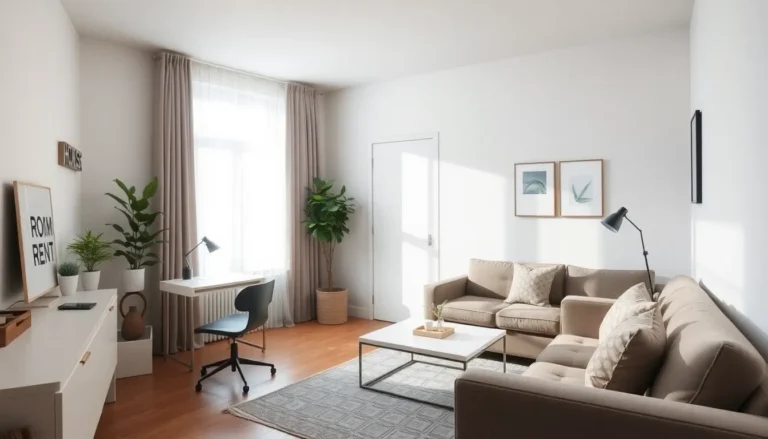Navigating the world of rental agreements can be tough. You might feel like you need a degree in legalese just to read your lease. Don’t worry, though. Understanding your rights as a tenant in New Hampshire is crucial for ensuring your living situation is all it should be, comfortable, safe, and fair. From knowing what repairs your landlord must handle to understanding your privacy rights, this guide covers it all. So, pour yourself a cup of coffee, and let’s jump into the essential rights for NH tenants that could save you from a lot of headaches.
Table of Contents
ToggleOverview of Tenant Rights in New Hampshire

In New Hampshire, tenant rights are grounded in both state law and lease agreements. Every renter is afforded specific rights that protect them against unfair practices.
- Right to a Habitable Home: Landlords must ensure that every rental property is in good condition. This means no leaky roofs, functioning heating, and safe electrical systems.
- Protection from Retaliation: If a tenant exercises their rights, like filing a complaint about a repair, landlords can’t evict or penalize them simply for standing up for their rights.
- Fair Treatment: Discrimination in housing based on race, color, religion, gender, or disability is illegal in New Hampshire.
Understanding Your Lease Agreement
Your lease agreement is essentially your rental Bible. It outlines the rules, obligations, and rights you have as a tenant. Here’s what to look for:
- Length of the Lease: Determine whether it’s month-to-month or for a longer term.
- Rent Amount: This includes the due date and any potential late fees.
- Rights and Responsibilities: Know what maintenance you must handle and what falls to your landlord.
Before signing, read everything carefully. It might feel a bit boring, but being clueless could lead to unexpected fees or obligations.
Rights Regarding Repairs and Maintenance
Tenants in New Hampshire have specific rights when it comes to repairs and maintenance. If the property isn’t livable due to repairs, here are the key points:
- Responsibility of the Landlord: Landlords must address issues affecting health and safety. This includes heating failures in winter or pest infestations.
- Tenant Notification: But, tenants also have a responsibility to report issues promptly. Ignoring problems can lead to greater damages that the tenant could indirectly be held liable for.
- Timeframe for Repairs: While landlords must act reasonably, there’s no specific timeframe mandated in the law. A prompt response does depend on the nature of the repair.
Privacy Rights and Entry Regulations
Your home should feel like a sanctuary, and that means you have clear privacy rights. Here’s what you need to know:
- Landlord Access: New Hampshire law requires that landlords provide reasonable notice before entering a rental unit, a minimum of 24 hours is common practice.
- Emergency Situations: In emergency circumstances, landlords can enter without advance notice, but this should be a rarity.
- Trespassing Rights: If you feel your landlord is entering excessively or without cause, you might have grounds to contest their actions.
Security Deposits: An In-Depth Look
Security deposits are common, but how they’re managed is critical. Here’s what you need to know about them in New Hampshire:
- Amount Limits: According to state law, security deposits cannot exceed one month’s rent.
- Return Timeline: After moving out, landlords have 30 days to return the deposit or provide an itemized list of deductions.
- Deductions: Commonly deducted reasons include unpaid rent or damage beyond normal wear and tear.
Understanding the rules surrounding security deposits can prevent disputes once you’re ready to move out.
Eviction Process and Tenant Protections
Eviction is a process that no one wants to face. But, knowing your rights can ease some stress:
- Valid Reasons for Eviction: Non-payment of rent or substantial lease violations are justifiable reasons. Landlords cannot evict tenants simply for complaining about repairs.
- Notice Requirements: Typically, landlords must provide a written notice before starting the eviction process. This gives the tenant a chance to rectify the situation before actual eviction proceedings begin.
- Court Proceedings: Evictions must go through legal proceedings. This offers tenants a chance to defend themselves in court.
Resources for NH Tenants
Staying informed is the best way to protect your rights as a tenant. Here are some helpful resources you might consider:
- New Hampshire Legal Assistance: They offer free legal advice to low-income tenants facing housing issues.
- The New Hampshire Department of Justice: Provides valuable resources and guidance about housing rights.
- Local Housing Authorities: Can help with understanding your rights and connecting you with additional services.






